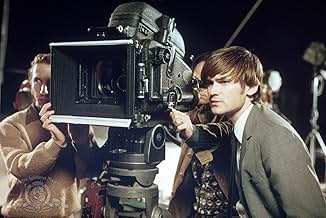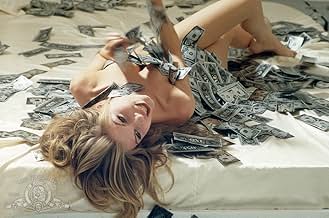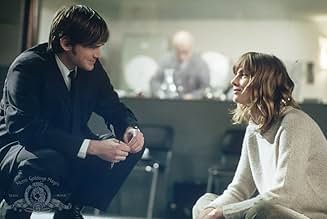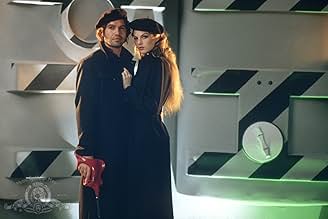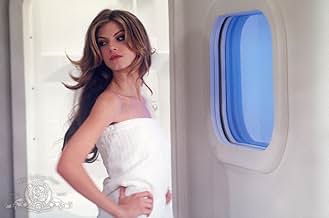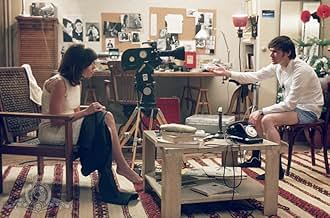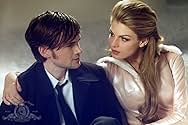VALUTAZIONE IMDb
6,2/10
5178
LA TUA VALUTAZIONE
Aggiungi una trama nella tua linguaA young filmmaker in 1960s Paris juggles directing a cheesy sci-fi debacle, directing his own personal art film, coping with his crumbling relationship with his girlfriend, and realizing tha... Leggi tuttoA young filmmaker in 1960s Paris juggles directing a cheesy sci-fi debacle, directing his own personal art film, coping with his crumbling relationship with his girlfriend, and realizing that he's infatuated with the sci-fi film's starlet.A young filmmaker in 1960s Paris juggles directing a cheesy sci-fi debacle, directing his own personal art film, coping with his crumbling relationship with his girlfriend, and realizing that he's infatuated with the sci-fi film's starlet.
- Regia
- Sceneggiatura
- Star
- Premi
- 1 candidatura in totale
Recensioni in evidenza
Despite the pedigree of being made by the latest Coppola clan member to enter the feature film directorial ranks, CQ came and went from theaters when it was released a few years go. Seeing it for the first time on Reel 13 on Saturday, I'm a little stunned as to why. Roman Coppola proves to be a promising, thoughtful filmmaker and as adept a student of cinema history as his Uncle Francis. CQ is an engaging, if loosely structured movie, managing to be simultaneously inventive and derivative, borrowing from and paying homage to everything from La Dolce Vita to the Marx Brothers.
Its primary source of influence is, of course, 1968's Barbarella, here thinly veiled as the fictional "Dragonfly", as the film within the film. CQ is about how Paul, a young editor (Jeremy Davies), working on said "Dragonfly" deals with balancing his career and his relationship as he works on both the big-budget sci-fi epic and directing his own personal documentary film. This set-up provides Coppola with three different planes of action going on – real life, the black and white documentary and the colorful, sexy, futuristic world of "Dragonfly". The fun really begins when Coppola deftly uses these formats to blur the lines of fantasy and reality when Paul, in his search for himself, begins to lose sight of where the boundaries for each of these worlds lie – or if they even exist.
In addition to Coppola's stellar usage of mixed media, the other key to CQ's success is Jeremy Davies, an extremely talented and severely underused young actor who quite possibly should have won an Oscar for his work in Saving Private Ryan and at least should have been nominated for last year's Rescue Dawn. I think there are less roles for him because he seems to insist on making quirky, out-of-the-box choices. However, when a director with vision is willing to roll the dice on him, he almost always delivers an inspired performance. CQ is no exception as Davies brings a believable, uncomfortable edge to Paul. He is a character who is lost and confused, but most actors would play him with a modicum of swagger. Davies makes him neurotic without being nebbish – as if still a boy in the body a man who isn't quite sure that he wants to grow up. At the heart of Davies' performance, however, still is that extra element of quirkiness that is all his own. It's that extra layer of thought he puts in to his performance and those unusual choices he makes that allows the character to feel fresh – different than what we're used to while at the same time, wholly plausible.
After all is said and done, with all its layers of meaning and different milieus represented within it, CQ ultimately becomes a dissertation on film and the nature of filmmaking as an artform. It depicts the tendency of the artist to lose himself in his work and how said artist can learn to manipulate the art to find his way again (it's no wonder I liked it so much). In that sense, it's a beautifully realized film and another highly auspicious debut from an almost unfairly talented family.
Its primary source of influence is, of course, 1968's Barbarella, here thinly veiled as the fictional "Dragonfly", as the film within the film. CQ is about how Paul, a young editor (Jeremy Davies), working on said "Dragonfly" deals with balancing his career and his relationship as he works on both the big-budget sci-fi epic and directing his own personal documentary film. This set-up provides Coppola with three different planes of action going on – real life, the black and white documentary and the colorful, sexy, futuristic world of "Dragonfly". The fun really begins when Coppola deftly uses these formats to blur the lines of fantasy and reality when Paul, in his search for himself, begins to lose sight of where the boundaries for each of these worlds lie – or if they even exist.
In addition to Coppola's stellar usage of mixed media, the other key to CQ's success is Jeremy Davies, an extremely talented and severely underused young actor who quite possibly should have won an Oscar for his work in Saving Private Ryan and at least should have been nominated for last year's Rescue Dawn. I think there are less roles for him because he seems to insist on making quirky, out-of-the-box choices. However, when a director with vision is willing to roll the dice on him, he almost always delivers an inspired performance. CQ is no exception as Davies brings a believable, uncomfortable edge to Paul. He is a character who is lost and confused, but most actors would play him with a modicum of swagger. Davies makes him neurotic without being nebbish – as if still a boy in the body a man who isn't quite sure that he wants to grow up. At the heart of Davies' performance, however, still is that extra element of quirkiness that is all his own. It's that extra layer of thought he puts in to his performance and those unusual choices he makes that allows the character to feel fresh – different than what we're used to while at the same time, wholly plausible.
After all is said and done, with all its layers of meaning and different milieus represented within it, CQ ultimately becomes a dissertation on film and the nature of filmmaking as an artform. It depicts the tendency of the artist to lose himself in his work and how said artist can learn to manipulate the art to find his way again (it's no wonder I liked it so much). In that sense, it's a beautifully realized film and another highly auspicious debut from an almost unfairly talented family.
Folks, I really, really wanted to like this film. Alas, I found myself looking at the DVD's timer, wondering when the thing would end. So many elements are likable: groovy sixties design, groovy music, groovy chicks, groovy references to (truly) groovy sixties flicks with chicks. But it doesn't hold together. It doesn't flow. It doesn't involve you.
The self-referential dialog and editing had the cloying and self-conscious feel of a student film. (And I had to sit through plenty of those in college, including my own ;-)
Overall, I think Roman has promise, but he has a lot of catching up to do with his sister.
The self-referential dialog and editing had the cloying and self-conscious feel of a student film. (And I had to sit through plenty of those in college, including my own ;-)
Overall, I think Roman has promise, but he has a lot of catching up to do with his sister.
...and in the characters Paul(played by Jeremy Davies) and Andrezej (played by Gerard Depardieu),together are an alter ego of mine. I mean, a film director who is always unhappy, in fact, which is compelled to work due to the bad taste of the producers and the general public stupidity. In my opinion, that's what Roman Coppola wanted to tell us. The film is clearly an homage to the film Danger: Diabolik, directed in 1968 by Mario Bava. Angela Lindvall is a replica of the character played by Marisa Mell(Eva Kant in Danger: Diabolik). I am convinced that Coppola would cast her in CQ, if he had not died in the meantime. As he did with John Phillip Law, who is the star of Bava's film, and also the star of Barbarella, made also in 1968. The action in CQ is Paris 1969, one year after, and it feels also the influence of Roger Vadim and the atmosphere of Barbarella. Jeremy Davies is subtle, Giancarlo Giannini is effective, Billy Zane is funny and Angela Lindvall is sexy. I think that many fall into the trap of considering this a farce-action-film-eurospy-soft-love-story. It's more than that, it's a subtle metaphor which says clearly that the film industry is a huge conveyor and how very hard is to create a masterpiece. 10 out of 10.
I admit I was just going to see this film for the close-ups of my favorite actor Billy Zane because its been far too long since I've seen his face on the big screen. However, the film was actually well done and had an interesting 60's tone which is pulled off very well. But the one thing that bothered me was why the title "CQ" ? It had one brief reference to CQ > seeks you but not enough to name a whole movie after it. Anyway, Billy did a good job and was very entertaining so for all you Billy fans, go see CQ if you can find it playing near you.
The creative process should boggle anyone's mind. I mean if you took one look at the time and energy exerted on one motion picture you'd probably scream. Sure some movies deserve the time spent on them. Nobody is going to begrudge the creative team behind 2001: A SPACE ODYESSY or CITIZEN KANE. But what about the creative team behind HOWARD THE DUCK. Did not talented people put just as much time and energy into that film? CG is a film about the creative process thru the director working on a film just a stupid and banal as HOWARD THE DUCK.
It tells the story of a young and talented film editor named Paul (Jeremey Davies, Spanking the Monkey) and his short stint as director on a B grade science fiction film in 1969. The film about a secret agent named Dragonfly (Anglea Lindvall, New York Stories). It's Moonraker meets Charles Angels. This film is directed by a creative visionary named Andrezej (Gérard Depardieu, The Closet). After months of editing the end still needs to be reworked, and Andrezej has been thrown off the picture because his producer (Giancarlo Giannini, Hannibal) he taking for to long to finish.
Andrezej is replaced by a snotty kid named Felix DeMarco (Jason Schwartzman, Rushmore), he's the kind of guy who doesn't deserve to be where he is and everybody knows it. When tragedy strikes the new director. Paul is called in to finish the picture.
First time director Roman Coppola, has crafted a disjointed but still overly satisfying film. Making movies is a game of luck and CQ (The Morse Code phrase for Seek You) has some real moments of brilliance. It's about the lengths money men will go to make a picture, it's about compromise, and it's also about the creative quest to make an audience happy all while keeping yourself from going crazy.
Jeremy Davies is one of the most underused actor's in Hollywood. He does so well with each and every performance, even if the films suck (See Million Dollar Hotel, for example). His Paul is both nervous and yet calculated. He hides in the shadows only to jump out and surprise you. Like any number of craftsman and artisans he's the real talent and he props up those around him.
I loved how Coppola, counterpoints the silly B movie with Paul's other black and white art film. Paul is making this drippy and disjointed film at his house. It's this surreal black and white film that features disjointed takes, and exists for arts sake more than anything else. Of course it's silly and pretentious, but in the end it's all about creating your own film, and moving on with your life. Plus it's really an excuse to p*ss off his live in lover Marlene (Elodie Bouchez, Dreams of Trespas).
Marlene is a good counterpoint to Dragonfly or Valentine whom is the lead in the movie. She's the woman Paul truly lusts after. Each women stars in one of his movies and you can tell which on he thinks is a hero and which is a villain. This gives Paul a flawed dimension and these women bring out the two faces of this talented man.
Overall CQ is a tad vague. I liked it that way; something tells me if I knew what Coppola was truly trying to say it would be quite a letdown. Thankfully I will take my interpretation and leave it at that.
I also loved the B-picture itself. It was campy and silly. Like Austin Powers without the laughs, and tons more style. Lindvall was the perfect choice for Dragonfly because she looks like a Model in the Sixties. Like a Breck girl from the 60's.Plus, Billy Zane's (Titanic) small roll as Mr. E, is so goofy and yet so suave you can't help but be pulled in.
CQ is not for everyone and a nominal understanding of the creative process of film will enhance it. But if you're looking for something a little different, a little out of the ordinary, and a little weird, give CQ a try.
**** out of 5
It tells the story of a young and talented film editor named Paul (Jeremey Davies, Spanking the Monkey) and his short stint as director on a B grade science fiction film in 1969. The film about a secret agent named Dragonfly (Anglea Lindvall, New York Stories). It's Moonraker meets Charles Angels. This film is directed by a creative visionary named Andrezej (Gérard Depardieu, The Closet). After months of editing the end still needs to be reworked, and Andrezej has been thrown off the picture because his producer (Giancarlo Giannini, Hannibal) he taking for to long to finish.
Andrezej is replaced by a snotty kid named Felix DeMarco (Jason Schwartzman, Rushmore), he's the kind of guy who doesn't deserve to be where he is and everybody knows it. When tragedy strikes the new director. Paul is called in to finish the picture.
First time director Roman Coppola, has crafted a disjointed but still overly satisfying film. Making movies is a game of luck and CQ (The Morse Code phrase for Seek You) has some real moments of brilliance. It's about the lengths money men will go to make a picture, it's about compromise, and it's also about the creative quest to make an audience happy all while keeping yourself from going crazy.
Jeremy Davies is one of the most underused actor's in Hollywood. He does so well with each and every performance, even if the films suck (See Million Dollar Hotel, for example). His Paul is both nervous and yet calculated. He hides in the shadows only to jump out and surprise you. Like any number of craftsman and artisans he's the real talent and he props up those around him.
I loved how Coppola, counterpoints the silly B movie with Paul's other black and white art film. Paul is making this drippy and disjointed film at his house. It's this surreal black and white film that features disjointed takes, and exists for arts sake more than anything else. Of course it's silly and pretentious, but in the end it's all about creating your own film, and moving on with your life. Plus it's really an excuse to p*ss off his live in lover Marlene (Elodie Bouchez, Dreams of Trespas).
Marlene is a good counterpoint to Dragonfly or Valentine whom is the lead in the movie. She's the woman Paul truly lusts after. Each women stars in one of his movies and you can tell which on he thinks is a hero and which is a villain. This gives Paul a flawed dimension and these women bring out the two faces of this talented man.
Overall CQ is a tad vague. I liked it that way; something tells me if I knew what Coppola was truly trying to say it would be quite a letdown. Thankfully I will take my interpretation and leave it at that.
I also loved the B-picture itself. It was campy and silly. Like Austin Powers without the laughs, and tons more style. Lindvall was the perfect choice for Dragonfly because she looks like a Model in the Sixties. Like a Breck girl from the 60's.Plus, Billy Zane's (Titanic) small roll as Mr. E, is so goofy and yet so suave you can't help but be pulled in.
CQ is not for everyone and a nominal understanding of the creative process of film will enhance it. But if you're looking for something a little different, a little out of the ordinary, and a little weird, give CQ a try.
**** out of 5
Lo sapevi?
- QuizAfter being fired, Andrezej puts his fist through the screening room door. This is a reference to Francis Ford Coppola (father of director Roman Coppola) and his short temper. When the editors get a framed section of the destroyed wall, it is actually a portion of a wall the elder Coppola wrecked in his early directing days.
- BlooperIn the tunnel, when Dragonfly swerves in reverse, there already are skid marks on the ground along the path taken by the car's tires.
- ConnessioniFeatured in On the Set of 'CQ' (2002)
- Colonne sonoreCe Soir, Je Vais Boire
Lyrics by Gilles Thibaut
Music by Bruno Canfora
Performed by Claude François
Courtesy of Universal International Music, B.V.
Under license from Universal Music Enterprises
I più visti
Accedi per valutare e creare un elenco di titoli salvati per ottenere consigli personalizzati
- How long is CQ?Powered by Alexa
Dettagli
- Data di uscita
- Paesi di origine
- Sito ufficiale
- Lingue
- Celebre anche come
- Агент «Стрекоза»
- Luoghi delle riprese
- Aziende produttrici
- Vedi altri crediti dell’azienda su IMDbPro
Botteghino
- Budget
- 7.000.000 USD (previsto)
- Lordo Stati Uniti e Canada
- 414.358 USD
- Fine settimana di apertura Stati Uniti e Canada
- 54.942 USD
- 27 mag 2002
- Lordo in tutto il mondo
- 499.891 USD
- Tempo di esecuzione1 ora 28 minuti
- Colore
- Mix di suoni
- Proporzioni
- 1.85 : 1
Contribuisci a questa pagina
Suggerisci una modifica o aggiungi i contenuti mancanti



